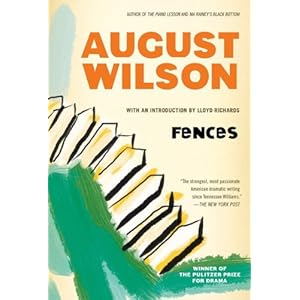[The above video is mostly a reading of the text below, with
an occasional aside thrown in for good measure as they strike me as
relevant. I welcome questions, comments,
or concerns about the material contained in this video.]
Published in 1983, this is the sixth play of August Wilson’s “Pittsburgh Cycle,” and by far the best known, winning the 1987 Pulitzer Prize for Drama. All the plays in the cycle take up various aspects of the American-American experience during the first part of the twentieth century. “Fences,” as the namely subtly hints at, looks at the differing ways of life and cultural assumptions that Americans – black and white – of two generations as they find themselves growing further and further apart.
The action revolves around Troy Maxson, the dictatorial, autocratic patriarch who rules over the play with a brooding, constant, suffocating presence. Everyone slavishly concedes to his authoritarian, overbearing personality – his wife Rose, his best friend Bono, and his two grown children, Lyons and Cory. Troy, now a garbage man, was once an aspiring baseball player when he was younger, but was unable to break into the game because of the color barrier. When his son shows similar athletic promise, he shuts down any opportunity for him to pursue it, demanding that he get a job at the local store instead. Whether it is out of spite or not is unclear, but his negation of his son’s dreams comes across as mean-spirited and petty. At another point, his son Cory asks his father “How come you ain’t never liked me?” to which Troy responds “Liked you? Who the hell said I gotta like you?”
Much of the play revolves around the ways Troy exerts his power over his wife and children. His son, Lyons, occasionally asks him for money, which always makes Troy bristle with resentment and sends him into a seething tirade about how Lyons shouldn’t feel entitled and should stop coming by just to borrow money. Troy has an affair with Alberta (whom we never see) and conceives a child with her, Raynell, whom we only see in the last scene at Troy’s funeral.
The title refers to the fence that Troy and his son try to build throughout the play, yet Troy always seems to be castigating him for doing something else, but it preforms other functions, too. Troy has an (extreme) aversion toward death and loss; the fence is, one supposes, there to militate against death. The fence had another, much more resonant meaning for me: it stands for the wall that separates black Americans raised in the 1930s and 1940s from their children raised in the 1960s, with all the social, cultural, and political baggage that comes along with that chasmal divide.
At the end of the play, Wilson has certainly made a hell of a character out of Troy – a character who begs for the readers’ sympathy. But as great of a playwright as he is, he just couldn’t bring me there; I could never see Troy as anything other than a tyrannical despot. I felt sorry for his children, and wondered why his wife suffered his presence. I tried to find virtues in him, but the fact that he is a soi-disant hard-drinking Lothario really doesn’t help his case. I have to admit, however, that I am biased: Troy reminds me of someone in my own family whose very presence I cannot bear, yet who I grew up around, and whose philistinism I occasionally still have to bear. Much of what he said in the play, his motivations, his attitudes, are exactly like those of said relative. I know it is precisely this fearful symmetry which caused such a visceral reaction toward the play itself. As much as I disliked Troy, the play itself is superb. To capture the psychology of a man like Troy, as well as his long-suffering wife and children, takes a superb craftsman, which Wilson definitely is.

No comments:
Post a Comment